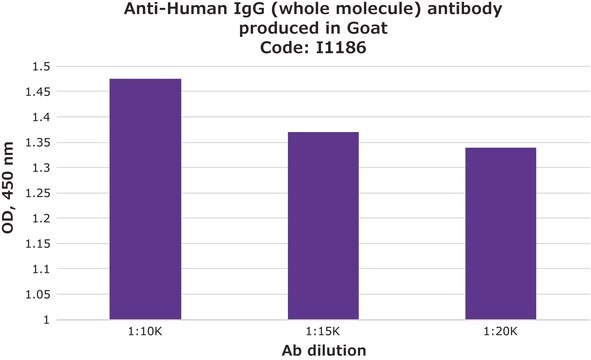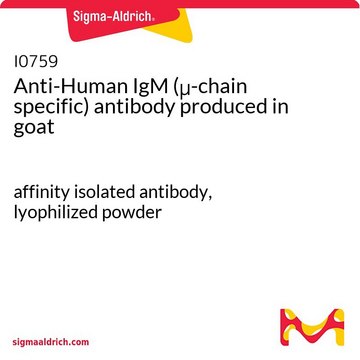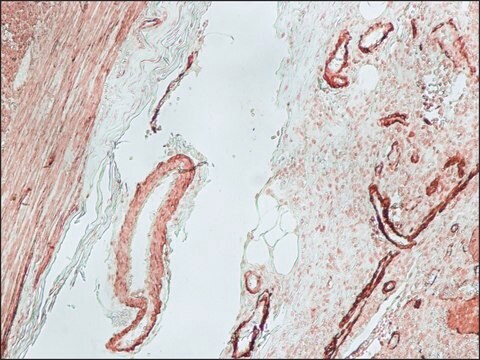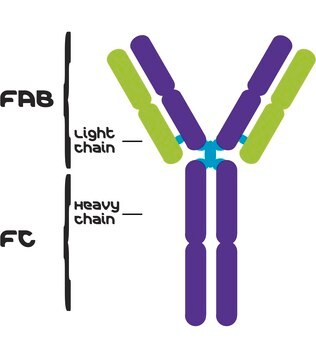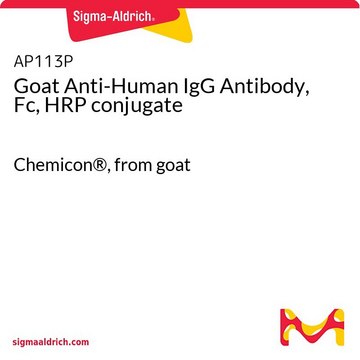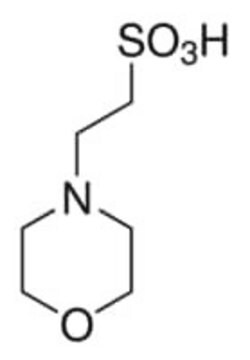B1140
Anti-Human IgG (γ-chain specific)-Biotin antibody produced in goat
affinity isolated antibody, buffered aqueous solution
Sign Into View Organizational & Contract Pricing
All Photos(1)
About This Item
Recommended Products
biological source
goat
Quality Level
conjugate
biotin conjugate
antibody form
affinity isolated antibody
antibody product type
secondary antibodies
clone
polyclonal
form
buffered aqueous solution
technique(s)
direct ELISA: 1:20,000
storage temp.
2-8°C
target post-translational modification
unmodified
Related Categories
General description
Human IgG antibodies are primarily responsible for the facilitation of humoral immune responses such as complement fixation, placental transport, and phagocytosis among many others. Anti-human IgG (γ-chain specific)-biotin antibody can be used in preparation of the double-codified gold nanoparticle label. Goat anti- human IgG (γ-chain specific)-biotin antibody reacts specifically with human IgG but not with other immunoglobulins.
Human IgGs are glycoprotein antibodies that contain two equivalent light chains and a pair of identical heavy chains. IgGs have four distinct isoforms, ranging from IgG1 to IgG4. These antibodies regulate immunological responses to allergy and pathogenic infections. IgGs have also been implicated in complement fixation and autoimmune disorders
Anti-Human IgG (γ-chain specific)-Biotin antibody is specific for human IgG and does not bind other human immunoglobulins.
Anti-Human IgG (γ-chain specific)-Biotin antibody is specific for human IgG and does not bind other human immunoglobulins.
Immunogen
Purified human IgG.
Application
Anti-Human IgG (γ-chain specific)-Biotin antibody is suitable for use in ELISA (1:2000) and double-codified gold nanolabel-based immunoanalysis.
Anti-human IgG (γ-chain specific)-biotin antibody can be used in direct ELISA
Physical form
Solution in 0.01 M phosphate buffered saline, pH 7.4, containing 1% bovine serum albumin and 15 mM sodium azide
Disclaimer
Unless otherwise stated in our catalog or other company documentation accompanying the product(s), our products are intended for research use only and are not to be used for any other purpose, which includes but is not limited to, unauthorized commercial uses, in vitro diagnostic uses, ex vivo or in vivo therapeutic uses or any type of consumption or application to humans or animals.
Not finding the right product?
Try our Product Selector Tool.
Storage Class Code
10 - Combustible liquids
WGK
WGK 3
Flash Point(F)
Not applicable
Flash Point(C)
Not applicable
Choose from one of the most recent versions:
Already Own This Product?
Find documentation for the products that you have recently purchased in the Document Library.
Customers Also Viewed
F Lolli et al.
Clinical immunology and immunopathology, 59(2), 314-321 (1991-05-01)
We studied, with sensitive ELISAs, the anti-cardiolipin antibodies of the G, A, and M classes in the cerebrospinal fluid (CSF) and serum of 179 neurological patients. The CSF and serum of 2 systemic lupus erythematosus (SLE) patients presented IgG anti-cardiolipin
Adriano Ambrosi et al.
Analytical chemistry, 79(14), 5232-5240 (2007-06-21)
A novel double-codified nanolabel (DC-AuNP) based on gold nanoparticle (AuNP) modified with anti-human IgG peroxidase (HRP)-conjugated antibody is reported. It represents a simple assay that allows enhanced spectrophotometric and electrochemical detection of antigen human IgG as a model protein. The
S D Litwin et al.
Clinical immunology and immunopathology, 47(1), 75-83 (1988-04-01)
The immunologic characteristics of normal persons with high sera IgD values were analyzed. Elevated sera IgD appeared to be the consequence of increased biosynthesis as reflected by an increased number of IgD-Ig-containing cells, an elevated sera IgD, lambda/kappa ratio, and
Fang Tang et al.
Journal of immunology (Baltimore, Md. : 1950), 186(12), 7264-7268 (2011-05-18)
Six years have passed since the outbreak of severe acute respiratory syndrome (SARS). Previous studies indicated that specific Abs to SARS-related coronavirus (SARS-CoV) waned over time in recovered SARS patients. It is critical to find out whether a potential anamnestic
Lia Vassena et al.
PLoS pathogens, 8(4), e1002636-e1002636 (2012-04-19)
Although treatment with interleukin-7 (IL-7) was shown to transiently expand the naïve and memory T-cell pools in patients with chronic HIV-1 infection receiving antiretroviral therapy (ART), it is uncertain whether a full immunologic reconstitution can be achieved. Moreover, the effects
Our team of scientists has experience in all areas of research including Life Science, Material Science, Chemical Synthesis, Chromatography, Analytical and many others.
Contact Technical Service
